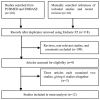Quantitative assessment of the effect of epidermal growth factor 61A/G polymorphism on the risk of hepatocellular carcinoma
- PMID: 26722312
- PMCID: PMC4665625
- DOI: 10.3892/ol.2015.3723
Quantitative assessment of the effect of epidermal growth factor 61A/G polymorphism on the risk of hepatocellular carcinoma
Abstract
The association between hepatocellular carcinoma (HCC) and the epidermal growth factor (EGF) 61A/G polymorphism has been analyzed in several studies, but results remain inconsistent. Therefore, the aim of the present study was to quantitatively summarize the association between the EGF 61A/G polymorphism and the risk of HCC. The PubMed and EMBASE databases were searched for studies published prior to May 1, 2014. The overall, subgroup and sensitivity analyses were conducted using Comprehensive Meta-Analysis software, version 2.2. In total, 12 published case-control studies, consisting of 2,095 patients with HCC and 3,766 control individuals, were included in the present study. Meta-analysis of the included studies revealed that EGF 61A/G polymorphism contributed to the risk of HCC under all four genetic models, consisting of the G vs. A (OR, 1.25; 95% CI, 1.11-1.40), GG vs. AA (OR, 1.53; 95% CI, 1.26-1.85), GG vs. AG + AA (OR, 1.34; 95% CI, 1.13-1.58) and GG + AG vs. AA (OR, 1.27; 95% CI, 1.08-1.49) comparisons. Subgroup analysis further suggested that EGF 61A/G polymorphism was associated with the risk of HCC in patients and control individuals with liver disease, based on ethnicity and source of control, respectively. No other significance in residual subgroup analysis was observed. The present meta-analysis suggests that the EGF 61A/G polymorphism is associated with an increased risk of HCC and may be a potential marker for liver disease, such as hepatitis B virus infection, hepatitis C virus infection and liver cirrhosis.
Keywords: EGF 61A/G; hepatocellular carcinoma; meta-analysis; polymorphism.
Figures




Similar articles
-
Association between epidermal growth factor gene +61A/G polymorphism and the risk of hepatocellular carcinoma: a meta-analysis based on 16 studies.BMC Cancer. 2015 Apr 25;15:314. doi: 10.1186/s12885-015-1318-6. BMC Cancer. 2015. PMID: 25927412 Free PMC article.
-
EGF +61A/G polymorphism contributes to increased gastric cancer risk: evidence from a meta-analysis.Cancer Cell Int. 2014 Dec 12;14:134. doi: 10.1186/s12935-014-0134-4. eCollection 2014. Cancer Cell Int. 2014. PMID: 25729328 Free PMC article.
-
Lack of association between EGF +61A>G polymorphism and melanoma susceptibility in Caucasians: a HuGE review and meta-analysis.Gene. 2013 Feb 25;515(2):359-66. doi: 10.1016/j.gene.2012.11.014. Epub 2012 Nov 29. Gene. 2013. PMID: 23201894 Review.
-
Genetic Polymorphism of Epidermal Growth Factor Gene as a Predictor of Hepatocellular Carcinoma in Hepatitis C Cirrhotic Patients.Asian Pac J Cancer Prev. 2020 Jul 1;21(7):2047-2053. doi: 10.31557/APJCP.2020.21.7.2047. Asian Pac J Cancer Prev. 2020. PMID: 32711431 Free PMC article.
-
EGF +61A>G polymorphism and gastrointestinal cancer risk: a HuGE review and meta-analysis.Gene. 2013 Apr 25;519(1):26-33. doi: 10.1016/j.gene.2013.01.057. Epub 2013 Feb 9. Gene. 2013. PMID: 23403233 Review.
Cited by
-
EGF rs4444903 polymorphism is associated with risk of HCV-related cirrhosis and HBV/HCV-related hepatocellular carcinoma.Int J Clin Oncol. 2021 Nov;26(11):2053-2064. doi: 10.1007/s10147-021-01994-w. Epub 2021 Jul 21. Int J Clin Oncol. 2021. PMID: 34291370
-
Host genetic factors associated with hepatocellular carcinoma in patients with hepatitis C virus infection: A systematic review.J Viral Hepat. 2018 May;25(5):442-456. doi: 10.1111/jvh.12871. Epub 2018 Mar 1. J Viral Hepat. 2018. PMID: 29397014 Free PMC article.
References
LinkOut - more resources
Full Text Sources
Other Literature Sources
